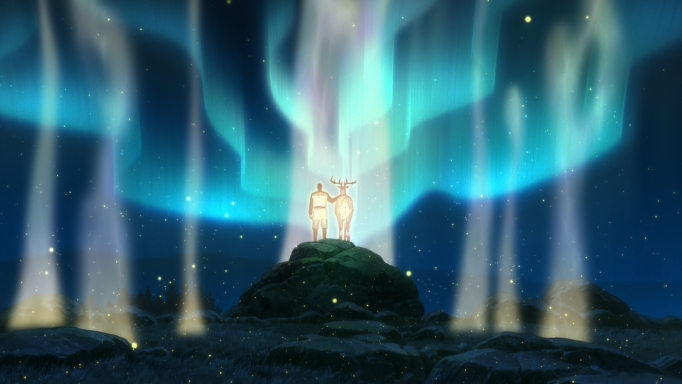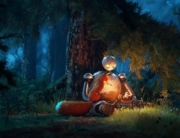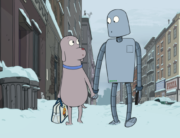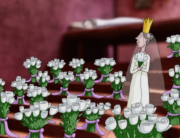The animation style and the narrative here are of a grand sweeping epic fantasy. Among the beautiful vistas of mountains, forests, and oceans are the domains of two enmities, the Aquafa and Zol. Long ago, Zol defeated the Aquafans, but what follows is more complex than a tale of liberation.
The story is set in motion by a deadly disease carried by a mythical pack of wolves who act on behalf of the Aquafa; the disease seems only to affect the inhabitants of Zol. When these wolves ravage a group of salt miners, who are mostly criminals, a man named Van (Shinichi Tsutsumi) and an orphaned girl, Yuna (Hisui Kimura), are mysteriously immune to the illness. He, it turns out, is an Aquafan, a lost member of the Antler Riders, a sort of deer-riding Knights of the Round Table. The strong and silent Van becomes the subject of several pursuits, among them a doctor seeking to cure the disease, a tracker seeking to capture him (for convoluted reasons), and the leaders of Zol and Aquafa themselves, whose political motives are more mixed than we might first suspect.
The tone is much like Princess Mononoke: the sincerity, the epic plane on which the action takes place, the sense that great matters are at stake. This is no surprise, considering directors Masashi Ando and Masayuji Miyagi worked for Studio Ghibli. Certainly, the animation displays Hayao Miyazaki’s influence, cofounder of the production company, and is worthy of him. There are gorgeous scenes of autumnal forests, imposing mountains, and ornate palaces, often with a level of detail in which even background figures can be seen in motion. There are also more abstract sequences, often involving Van’s psychic visions, that are similarly well wrought, though at times a little long and over the top.
Similarly, viewers may need to brace themselves for the plethora of sequences set to heart-tugging flute music, dialogue that is only ever in earnest, and some drawn-out scenes of action. Much of the film is actually violent, earning an R rating, which is surprising given that the tone feels so innocently sincere. Yet the movie is so clearly aiming for an open appeal to the heart that one is inclined to judge it on its own terms. It is based on a series of books by Nahoko Uehashi, and there are so many moving parts, so many levels of intrigue, and, strangely, not quite enough time for them all that the characters and the emotional core of the story never come fully into focus, and by the end, none of the climactic moments have the resonance or satisfaction that they should.
Nevertheless, I was still inclined to feel more positively about The Deer King, not only because of the classic style of its animation, but also because it portrays a world beyond simply good vs. evil. There are also some glorious little scenes of wonder, like a fight in the forest with a group of “stilt-walkers.” However, the confusion one experiences could have been more fruitful if the convoluted story lines were given more space—it may have needed to be a longer film, or perhaps a TV series.







Leave A Comment